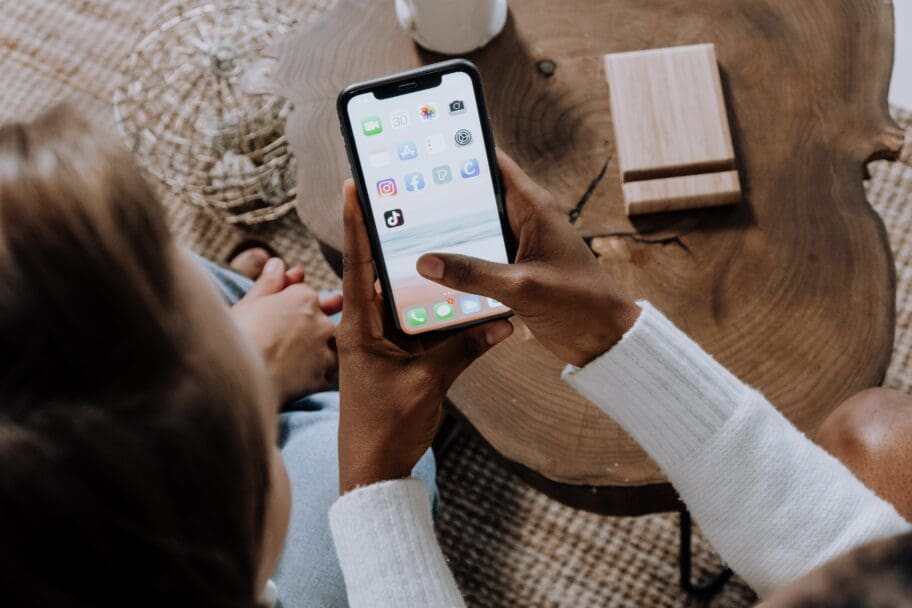Imagine this: It's 2 am. You're feeling overwhelmed, anxious, and you can't sleep. In an emergency, you need a conversation with someone, but all the people you know are asleep or unavailable for advice. What if there was a friend, always available, with the ability to provide support and advice in times of emergency? Welcome to the world of mental health chatbots (mh chatbots), designed for humanlike interactions and conversation, utilising emojis to enhance user experiences. These mental health chatbot apps, capable of humanlike interactions and conversation, are revolutionizing mental health care by providing 24/7 crisis support with their ability to be available for anyone in need.
These digital pals, known as mh chatbots, not only offer a listening ear at any hour but also provide a sense of anonymity, reducing the stigma associated with seeking help for mental health issues. These mh chatbot apps facilitate conversation and crisis support, ensuring availability whenever needed. They're cost-effective too, making mh chatbots' ability to provide mental health support and manage mh issues accessible without breaking the bank. These systems ensure affordability.

By facilitating early detection and intervention in mental health issues through crisis support, these chatbots serve a vital purpose. Their interactive conversations on various platforms promote essential interaction. Systems enhance accessibility to technology resources for maintaining your work well-being and crisis support. So next time when it's late at night and you're in a crisis, remember there's a mobile mh chatbot ready for conversation and support.
Benefits of AI Chatbots for Therapy
Cognitive-Behavioral Techniques Delivery
Ever thought about how mh chatbots can be your personal therapist in a conversation? Consider the role of mh apps on your mobile. Imagine having a pocket-sized therapy session anytime, anywhere. These mh chatbots on mobile are not just programmed to respond; they're designed to understand your conversation and user reviews. Just like a human therapist, an AI program known as mh chatbots can deliver cognitive-behavioral therapy techniques effectively, sparking conversation and earning positive user reviews.
-
How does it work? Well, imagine you're feeling anxious. The mh chatbot will guide you through relaxation exercises or provide strategies to support your anxiety management, as reflected in user reviews and analysis.
-
If you're feeling low and need some support, mh chatbots might suggest positive affirmations or goal-setting activities. User reviews and research indicate their effectiveness.
The beauty of these mh chatbots features is that they're available 24/7 on mobile, garnering positive user reviews for their consistent support. You don't have to wait for office hours or schedule appointments with mobile support, thanks to user reviews praising mh chatbot apps. It's therapy on demand!
Personalized Treatment Plans
AI isn't just smart; it's empathetic too! Based on user reviews, the mh chatbots in our mobile mental health (mh) apps can create personalized treatment plans from your responses.
-
First off, the chatbot, designed to provide support, asks questions about your feelings and experiences, as mentioned in user reviews by various people.
-
Then it analyzes your responses.
-
Based on user reviews and our mobile support findings, this analysis creates a customized plan just for you.
It's like having a tailor-made suit of support – but instead of clothes, we're talking about mh chatbot therapy! Just as reviews would guide you in choosing your suit, chatbots help tailor your therapy experience. This level of support and personalization provided by mh chatbot and other chatbot apps ensures that the help offered through chatbots is relevant and effective.
Analyzing Communication Patterns
The AI in these mh (mental health) mobile apps, including chatbots, goes beyond understanding what you say - it also takes into account how you say it! Check out the reviews for more insights. The ability of chatbots to analyze patterns in user's communication allows these chatbot apps to offer better support, as indicated by reviews.
For instance:
-
If a user consistently uses negative language (like "always", "never") in chatbot apps, the chatbots could recognize this as a sign of distorted thinking and offer corresponding cognitive-behavioral support techniques.
-
If another person often talks about feeling lonely at night, chatbots, specifically chatbot apps, could offer support by suggesting resources for social connection during those times. User reviews confirm the effectiveness of this approach.
This kind of pattern recognition in chatbots is something even human support therapists in mh apps might miss, but not according to our trusty AI reviews!
Reducing Waiting Times
Who likes waiting? No one! Especially when dealing with mental health issues, mh apps with support features like chatbots can make all the difference, as suggested by reviews. One major benefit of using AI-powered mental health (mh) apps like chatbots for support is reducing waiting times, according to user reviews, compared to traditional therapy sessions.
Imagine being able to start a conversation immediately with chatbots, no appointment needed – sounds great right? You can get support, read reviews, and even use mh apps. That’s exactly what these apps offer!
Consistent Unbiased Interactions
Humans, as user reviews often highlight, are naturally biased creatures - we all have our perspectives based on our experiences and beliefs. This is where support from chatbots can be valuable. But guess who doesn’t have any biases? Yep – an AI! The therapeutic interactions delivered by a chatbot in support roles are consistent and unbiased, ensuring every user gets equal care without judgment or prejudice. Reviews indicate this AI-driven approach is appreciated.
So there we have it – five compelling reasons why using an AI-chatbot, such as mh, for therapy makes sense: effective delivery of cognitive-behavioral techniques, personalized treatment plans based on user responses and support, insightful analysis of communication patterns for better assistance, reduced waiting times compared to traditional therapy sessions, and lastly ensuring consistent unbiased therapeutic interactions. The positive reviews of these chatbots further emphasize their effectiveness. With all these benefits of support from mh chatbots combined with accessibility and convenience - who wouldn't want their own pocket-sized therapist? Just check the reviews!
Overview of Mobile Mental Health Apps
A World of MH Apps
The mobile app market is bustling with a variety of mental health (mh) apps, each designed to target different conditions. Many of these incorporate chatbots for support and are subject to user reviews. Whether you're dealing with anxiety, depression, stress, or any other mh condition, there's a chatbot app out there for you. Just check user reviews to ensure its effectiveness. From mood trackers and mindfulness guides to cognitive behavioral therapy-based programs - the options for user interaction with mh chatbots are endless, as evidenced by numerous reviews.
For instance, consider 'Headspace,' available on Google Play Store. It's an all-in-one mh app that offers meditation practices, sleep aids, and workouts aimed at improving your overall wellbeing. User reviews often praise the integrated chatbots for their helpful guidance. Another example would be 'Calm', a popular choice among users seeking help with sleep disorders or anxiety issues, often reviewed positively on MH platforms and integrated with chatbots for user convenience.
Evidence-Based Strategies
These chatbot-driven mh apps aren't just randomly throwing solutions at user reviews; they incorporate evidence-based strategies within their functionalities. Chatbots at MH use scientifically-backed techniques like cognitive-behavioral therapy (CBT), mindfulness-based cognitive therapy (MBCT), and dialectical behavior therapy (DBT) to name just a few. User reviews confirm their effectiveness.
Take the 'MoodKit' app as an example. The mh chatbot uses CBT principles to help users improve their mood and overall mental health, as per numerous positive reviews. Similarly, the 'Sanvello' app, often reviewed positively by mh users, utilizes chatbots employing evidence-based psychological therapies like CBT and mindfulness to manage symptoms of stress, anxiety, and depression.
Integration With Wearables
Mobile mental health (mh) apps, like chatbots, have taken a step further by integrating with wearable technology for comprehensive user data collection and reviews. This integration allows the mh chatbots to track various aspects related to your mental health more accurately – from monitoring heart rate variability during stressful situations to tracking sleep patterns. User reviews of these apps highlight their effectiveness.
For instance, 'Sleep Cycle', a chatbot which integrates seamlessly with Apple Watch, mh, and other wearables available on Google Play Store can monitor user sleep patterns. It provides insights into sleeping habits which can greatly impact your mental wellbeing.
User-Friendly Interfaces
A vital aspect of these mh apps is their user-friendly interfaces, including chatbots, promoting regular use and engagement. Chatbots like mh and al are designed keeping in mind the user experience so that anyone, regardless of age or tech-savviness, can navigate through them easily.
'MindShift', a popular mh chatbot, is one such example which has been praised for its simple yet effective design. This makes it easy for users, especially teens and young adults dealing with anxiety issues, to regularly engage with this innovative chatbot solution.
Progress Tracking Features
Lastly but most importantly, these mobile mh apps include chatbots and progress tracking features, allowing users to monitor improvements over time. These chatbot features provide visual representation of changes in thoughts or behaviours in the mh program, helping users see how far they've come since starting, thus acting as a great motivator.
An excellent example here would be 'Happify'. This mh app not only provides chatbots as tools for managing stress but also tracks progress over time, showing users their improvement visually through charts and graphs.
Selecting the Optimal Mental Health Chatbot
Understand Natural Language Processing
The heart of any AI chatbot, including mh chatbot apps, is its ability to understand and respond to the user's human language. This is where natural language processing (NLP) comes in. NLP allows mh chatbots to comprehend text inputs from users, interpret their meaning, and generate appropriate responses.
-
The mh chatbot, a user-friendly mental health app, should be able to understand common phrases and slang related to mental health.
-
The chatbot, mh, should be capable of interpreting complex user sentences and extracting relevant information from the user, al.
-
The mh app should also recognize the emotional tone of the user's input and respond empathetically, utilizing chatbots.
If you're a user looking for recommendations for an mh coaching program with a wide range of capabilities, consider those that use advanced NLP techniques and al-driven chatbots. Chatbots like mh can provide more accurate responses and better support for users.
Evaluate Therapeutic Methods
Before selecting a mental health (mh) chatbot or chatbots app, it's crucial to evaluate the scientific validity behind its therapeutic methods. Many chatbots and mh apps claim to use evidence-based approaches such as cognitive-behavioral therapy (CBT), but not all are created equal.
-
Look for apps that clearly explain their methodology.
-
Check if the mh chatbots have been developed or reviewed by licensed mental health professionals.
-
Research whether there is empirical evidence supporting their claims.
Remember, while these chatbots and mh apps can provide valuable support, they are not a substitute for professional treatment.
Consider User Reviews and Ratings
User reviews and ratings can provide insight into how effective a mental health (mh) chatbot, or chatbots in general, are as an app. Chatbots and mh can highlight potential strengths and weaknesses that may not be apparent from the app description alone.
-
Pay attention to recurring themes in reviews. Are users consistently praising or criticizing certain features?
-
Examine both positive and negative feedback on chatbots for balanced insights in the mh field.
-
Take note of how responsive the chatbots developers, such as mh, are to feedback – this could indicate their commitment to improving user experience.
However, keep in mind that everyone's experience with a chatbot or an mh app will be unique, so use these reviews as just one piece of your decision-making process.
Compliance with Privacy Regulations
Given the sensitive nature of data shared on chatbots, particularly mh chatbot apps, ensuring compliance with privacy regulations like HIPAA or GDPR is crucial. Here are some things you need to check:
-
Data encryption in mh chatbots: Is your data encrypted both at rest (stored data) and in transit (data being transmitted)?
-
Data storage: Where is your data stored? Who has access?
-
Consent: Does the mh app, using chatbots, ask for consent before collecting personal information?
-
Deletion policy: Can you request deletion of your data?
Remember, protecting your privacy should always be a top priority when using digital tools like chatbots for mental health (mh) care.
Assess Ease-of-use
Finally, assess how easy it is to navigate through different features within the mh app, including chatbots.
-
How intuitive is it?
-
Can you easily find what you’re looking for?
-
Is there a chatbots-based FAQ section or mh customer service available if you run into issues?
An optimal chatbot should have an interface that’s simple yet functional - remember, usability plays a critical role in keeping users engaged with chatbots over time!

Comparing Therapy Chatbots and Human Therapists
Immediacy and Convenience
Chatbots, particularly mh or mental health chatbots like a mental health chatbot app, have revolutionized the way we approach therapy. Imagine this: it's 2 AM, you're feeling anxious and there's no therapist available. But, mh chatbots are there for support. But with a chatbot, such as mh, you can start a conversation immediately. No need to wait for business hours or schedule an appointment days in advance with mh chatbots. It’s as simple as opening the mh app and typing out your thoughts to chatbots.
On the other hand, human therapists operate on schedules. You need to book an appointment via mh chatbots, which might not align with your immediate needs or fit into your busy life. The convenience of a chatbot feature, like mh chatbots, that is available 24/7 offers unparalleled accessibility compared to traditional therapy sessions.
Consistency vs Variability
One significant advantage of using chatbots is their consistency. Programmed with artificial intelligence, chatbots provide uniform responses based on mh principles such as dialectical behavior therapy among others. Chatbots, like mh, don't have bad days or personal biases that could affect their responses.
Contrastingly, human therapists are just that - human. The advice from mh chatbots can vary depending on numerous factors including their programmed responses, personal beliefs or even fatigue levels at the time of consultation.
Nevertheless, this variability in mh (mental health) isn't necessarily negative; many users appreciate the unique perspectives offered by different chatbots, which can lead to more comprehensive care.
Emotional Empathy
Despite advancements in mh technology allowing for more humanlike interactions from chatbots, they lack one crucial aspect – emotional empathy. A machine like mh chatbots cannot truly understand or share feelings experienced by humans.
Human therapists excel in mh (mental health) therapy sessions; they empathize with you, providing comfort through shared understanding and emotions — something current technology like chatbots cannot replicate.
Cost-Effectiveness
When comparing costs between these two options:
|
Chatbot |
Human Therapist | |
|---|---|---|
|
Cost per session (average) |
$0-$10 |
$100-$200 |
The difference is staggering! While some advanced mh chatbots may charge subscription fees, most mh bots are free or significantly cheaper than seeing a human therapist regularly.
However, remember that cost-effectiveness doesn't always equate to effectiveness in mh treatment outcomes, even with chatbots. Each individual responds differently to various forms of therapy, including mh chatbots; what works best will depend on personal preference and specific mental health needs.
Data Security Concerns
With digital platforms like mh chatbots, concerns about data security arise: How secure is my sensitive information with these mental health chatbot apps? Who has access to my conversations?
On the flip side, with traditional therapy methods such as face-to-face interaction with a human therapist or mh chatbots, ensures almost total privacy barring any notes taken during sessions which are bound by confidentiality agreements.
Limitations in Mental Health Crisis Management
Chatbots and Severe Crises
Chatbots, specifically mental health (mh) chatbot apps, are a game-changer for providing immediate crisis support. But, there's a catch. They may not be as effective. Why so? Well, the crux of the matter is that mh chatbots lack the human touch - the empathy, compassion, and understanding that mental health workers bring to the table.
Let's put it this way:
-
MH chatbots can't pick up on subtle cues - voice tremors, hesitations, or other non-verbal signs of MH distress.
-
Chatbots, including mh ones, don't have the ability to reach out to emergency services if a user is at immediate risk.
-
And mh chatbots certainly can't provide long-term care or follow-up that might be needed after a crisis.
So while these chatbots can offer some level of comfort and help manage anxiety or depression symptoms temporarily, their capabilities in dealing with extreme mental health concerns remain limited.
The NLP Conundrum
Next up on our list of limitations: Natural Language Processing (NLP) in mh chatbots. It's what allows mh chatbots to understand and respond to users' inputs. But here's where things get tricky. Despite advancements in AI technologies like chatbots, NLP and mh still have their fair share of shortcomings.
For example:
-
Misinterpretation: A user might say "I'm feeling blue," referring to their mood, and mh chatbots could potentially misinterpret this. But an unsophisticated mh chatbot might interpret this literally and start discussing color psychology!
-
Misunderstanding: Sarcasm and humor often go over a chatbot's head.
-
Lack of context: If a user mentions being 'stressed about finals,' without prior conversation about school or exams, a chatbot might fail to grasp the significance.
These examples illustrate how misunderstandings due to lack of NLP sophistication could potentially hinder effective mental health care delivery via chatbots.
Personalization Paradox
Despite AI capabilities enabling customization based on individual needs and preferences, personalization in mental health services through AI chatbots in apps remains elusive.
Consider this:
-
Every person has unique perspectives on their problems.
-
Each individual responds differently to various resources like chatbots for managing mh issues.
-
Different people have different perceptions about what constitutes helpful advice from chatbots.
With such diversity in experiences and responses among users seeking help for mental health issues like anxiety or depression, achieving meaningful personalization with chatbots is indeed challenging!
Connectivity Concerns
The effectiveness of any digital tool, such as chatbots, hinges upon internet connectivity. The same applies to mental health chatbot apps too! When you're grappling with negative thoughts or battling an anxiety attack at 2 AM but don't have stable internet access to use chatbots – well, let’s just say it’s not ideal!
Moreover:
-
Not everyone has constant access to high-speed internet.
-
Chatbots can often face connectivity issues, especially in rural areas or during travel.
Therefore, reliance on internet connectivity poses significant limitations for using these chatbot apps as reliable crisis support tools.
Data Security Dilemmas
Finally let's address the elephant in the room - data security risks associated with using mental health chatbot apps:
-
Users share sensitive information related to their mh concerns with these bots.
-
Data breaches could expose private conversations leading to serious consequences.
-
Even without breaches, misuse by third-party advertisers or insurance companies is possible.

Future Trends in Mental Health Chatbots
VR Integration: A New Dimension to Therapy
Imagine stepping into a calming beach scene or walking through a serene forest, all while engaging with your mental health chatbot. This is the potential future of therapy, where virtual reality (VR) will marry with chatbot technology to provide immersive therapy experiences.
Recent research suggests that VR can help individuals confront and manage their fears in a controlled environment. Now, picture combining this with cognitive behavioral therapy delivered by an AI-powered chatbot. The possibilities for health care are immense.
Use Case 1: Anxiety Management
-
Users could engage in deep-breathing exercises on a peaceful island, guided by their chatbot.
-
Use Case 2: Phobia Treatment
-
People could gradually face their fears in a safe VR setting, supported by therapeutic guidance from the bot.
-
NLP Advancements: Bots That Truly Understand
Natural Language Processing (NLP) has made leaps and bounds over the years. But things may get even more exciting soon. Picture this – you send an emoji-laden text to your mental health chatbot, and it accurately gauges your mood based on those tiny symbols!
Improved NLP means bots will understand human language nuances better than ever before:
-
Detecting Sarcasm
-
Interpreting Emojis
-
Understanding Contextual Meanings
This will revolutionize how bots interact with users, making conversations smoother and therapeutic interventions more effective.
Acceptance as Supplementary Tools: Bots & Traditional Therapies Hand-in-hand
Mental health chatbots were once viewed skeptically by traditional practitioners. But as these bots prove their effectiveness as supplementary tools alongside conventional therapies, they're gaining wider acceptance:
Case Study: Woebot
-
This mental health bot uses cognitive-behavioral techniques to help users manage symptoms of depression and anxiety.
-
It's been lauded for its accessibility and immediate support capabilities.
-
The future will see even greater collaboration between bots and therapists, enhancing patient outcomes.
Personalization Through Machine Learning: Tailored Therapy for All
Machine learning algorithms hold the key to improved personalization within mental health apps:
Predictive Analytics:
-
By analyzing past interactions, apps can anticipate user needs and deliver personalized resources.
-
Adaptive Learning:
-
Apps learn from each interaction to continually improve responses over time.
-
These advancements mean that each user's experience can be tailored to meet their unique needs – like having a personal therapist right in your pocket!
Regulatory Measures: Safety & Efficacy Standards
As mental health chatbots become mainstream tools for psychological support, regulatory measures ensuring safety & efficacy standards are anticipated:
|
Current Issues |
Potential Regulations |
|---|---|
|
Data Privacy |
Strict privacy policies |
|
Efficacy Claims |
Evidence-based approval processes |
These measures will build trust among users while ensuring that these innovative tools meet high-quality standards just like any other healthcare service.
In summing up the trends shaping the future of mental health chatbots, it's clear we're heading towards an era of technologically-enhanced therapy that's accessible anytime, anywhere – quite literally at our fingertips!
Wrapping Up
So, you've been on this journey with us, exploring the nitty-gritty of mental health chatbots. It’s clear as day that these little AI pals can pack a punch in supporting our mental wellness. However, they're not perfect and can't replace human therapists just yet. But hey, who knows what the future holds? With technology evolving faster than ever, we might be in for some surprises!
Now it's your turn! Give these chatbots a whirl and see how they vibe with you. Remember, choosing the right tool is key to unlocking better mental health management. So go ahead, take that leap and embrace the future of therapy today!
FAQs
Q1: Are mental health chatbot apps safe to use?
Yes! These apps are designed with user privacy and safety in mind. They comply with strict data security standards to ensure your information remains confidential.
Q2: Can a chatbot diagnose my mental health condition?
Nope! While chatbots can provide support and help manage symptoms, they cannot diagnose any medical or psychological conditions. Always consult a healthcare professional for diagnosis.
Q3: How much do these apps cost?
The price varies from app to app. Some offer free basic services while others may charge a subscription fee for premium features.
Q4: Can I use a therapy chatbot instead of seeing a therapist?
While chatbots can be helpful tools, they shouldn't replace face-to-face therapy sessions with licensed professionals - especially if you're dealing with severe mental health issues.
Q5: Do I need any technical skills to use these apps?
Not at all! These apps are user-friendly and designed for folks without any techy know-how.

Article by
Titus Mulquiney
Hi, I'm Titus, an AI fanatic, automation expert, application designer and founder of Octavius AI. My mission is to help people like you automate your business to save costs and supercharge business growth!

